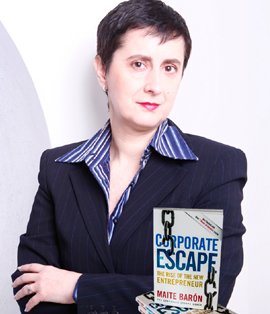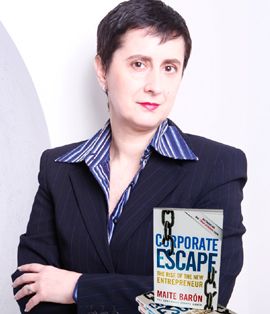MAKE THE HOLIDAY YOUR ESCAPE FROM BANKING BURNOUT
Published by Gbaf News
Posted on July 22, 2014
6 min readLast updated: January 22, 2026

Published by Gbaf News
Posted on July 22, 2014
6 min readLast updated: January 22, 2026

Why the banking sector needs to shift from burnout to wellbeing
By Maite Barón, CEO, The Corporate Escape™
The holiday season always offers a perfect opportunity to reflect on your career, your heath and what you want to do in the future.
During the rest of the year you’re so busy it’s easy to lose sight of the important issues that are affecting you and those around … until it’s often too late to do anything about them. For instance, have you ever wondered what happens to investment bankers when redundancy or burnout strike, like those colleagues you once worked with and then were suddenly gone?
Many try to get back to what they know as quickly as possible, but given that the investment banking sector is so competitive, is it really worth putting yourself through the mill – yet again?
The long hours aren’t going to go away. The only difference is that while not so long ago cranking out 80-90 hour weeks might have been worth it, what’s the upside now for all that pain?

Maite Baron
With senior posts still being cut – Credit Suisse reduced its senior investment banking staff in Europe by one-third last year – it’s going to be tougher than ever to get ‘that promotion’. Morgan Stanley, Barclays, and Nomura have also been disproportionately laying off high-cost senior personnel. Matters are made worse by positions being closed off, as more staff are expected to take on combined roles, selling multiple products.
So the choices are, you can either remain as you are, a slave to long hours, trapped by blocked career paths, or you can get out while you can.
Those who really can’t drag themselves away from the adrenaline rush and quest for bonuses will have to manage themselves well if they’re not to succumb to burnout. Research by ex-investment banker Alexandra Mitchell, now assistant Professor of Management and Organization at the University of California, suggests that four to six years into your career is peak burnout time.
If you survive that long – and many don’t, with nearly half of junior investment bankers at top banks getting out within three years – you will probably have realised that good self-management is key to survival. As a result, levels of burnout drop off after the age of 44, at least in the UK, though in the US and Hong Kong markets, burnout stays high through to the mid-50s.
So what are the best survival tips?
1. If you decide to stay make this a rational choice. Staying in a job you dislike without reason or purpose is emotionally and mentally wearing. So if you are going to remain where you are, make it a calculated decision, don’t stay simply through inertia or fear of things getting worse elsewhere.
2. Stay healthy. In a stressful and very demanding work environment, the only way you can support yourself physically and emotionally long-term is by exercising, eating well and sleeping properly. Together, these will bring down your levels of the stress hormone cortisol. Artificial crutches like alcohol and medication may seam to help short term, but you can’t rely on them indefinitely. You know it well, they are not a solution.
3. Add some variety to your life. If there are opportunities for getting involved with a community-focused project – many banks and corporate organizations have them as part of their reputation management programme – do so. This may seem counter-productive when you’re already under pressure, but doing something different is not only re-energising, but it can also give you greater visibility if you intend to stay where you are. And it will look good on your résumé if you don’t. Always think about your short and long-term opportunities.
4. Don’t over-commit in your private life. If work is demanding, make sure you get some fun and relaxation for and by yourself.
5. Stay away from those who keep whining about their job. If you end up collectively complaining about how bad life is, you’ll only reinforce your negativity towards your job. And why do that if you’ve decided to stay put? One way to avoid this is to mix with people outside of work, who have different interests and perspectives.
6. Don’t skip your holidays. I know you’ll think you’ll be missing out by taking a break. But if you don’t recharge your batteries, something’s going to snap – and that’s you. Take a break on your terms rather than being forced to by illness or stress.
So, even if you aren’t immediately looking to do something else, you should still spend time thinking and researching what you might do if you decided to leave.
Suddenly deciding ‘I’m out of here’ may work now and then, but most of the time you’ll regret a hasty decision later. Make your move with a plan in mind. What excites and motivates you? What would you love to do? Do you need different experience, or some other qualification to help you do this?
Visualise what and where you might be in one, three or five years’ time. Let your mind wander. Think through your options and start homing in on what feels right. If you don’t start seeing a new future for yourself, you’ll just end up doing more of the same for too long. We all have a great capacity to take pain and learn to live with our situation, and unless something causes us to refocus, or we choose to do so, nothing will change.
Maybe you could even stay where you are and retrain. That could give you a new lease of life with your current employer and would mean they don’t need to spend time or money recruiting a new face.
But if you really want to jump ship and get out of the investment banking game altogether, what are your alternatives?
Well, you could join a boutique investment bank that’s more focused on your area of expertise. Private equity, fund management and management consultancy are also possibilities, but what other options are there?
The reality is that you could move into a corporate development role in another sector entirely. Highly level financial, analytical or strategic skills are easily transferable into other business areas.
Or, as many are choosing to do, you could use those hard-earned skills not in other people’s companies, but in one of your own. This is the age of the entrepreneur and there really has never been a better time to set up in business.
So use these holidays to shape a new vision for your professional future and to seek out the right support to make that happen. Then as you lie on the beach, the dreams you once had won’t just be drifting away like waves on the sea.
Explore more articles in the Business category











